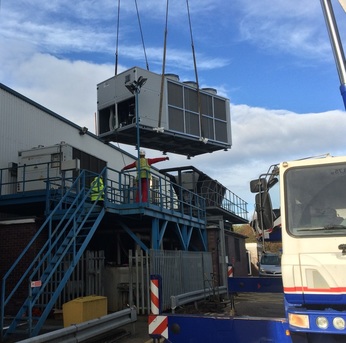Preparing your blog post
Preparing your blog post

An anaerobic digestion plant in the renewable energy sector sought to improve the quality and efficiency of its biogas output. The facility produces biogas by fermenting organic matter, then either burns the gas in engines to generate electricity or injects it into the national gas grid. However, excessive moisture in the biogas was hampering performance. Water vapor in the gas reduces combustion efficiency and can increase maintenance issues in the engines. To tackle this, the plant partnered with Refcool for a turnkey dewatering system – a solution to chill the gas stream and condense out moisture, thereby enhancing the calorific value of the biogas.
Moisture in biogas was the critical challenge. Wet biogas leads to lower burn efficiency (since water vapor absorbs heat) and causes corrosion and wear in generators or engine components, driving up maintenance costs. The client needed a reliable system to remove water from the gas continuously, even in varying operating conditions. This dehumidification process had to integrate with the existing digester setup, meaning it required custom piping (“stabbings”) into the main gas line and a safe way to dispose of the condensate. Another challenge was environmental: the system would be outdoors and exposed to weather, so it needed protection from freezing and the elements, especially since chilled surfaces can cause ice blockages in cold climates. Finally, as a turnkey request, the client looked to Refcool to handle everything from sourcing the dewatering unit and chiller to installation, insulation, and commissioning – all with minimal downtime.
Refcool delivered a complete dewatering system integrated with a packaged industrial chiller. The core of the system is a specialized gas-to-liquid heat exchanger designed specifically for dewatering biogas. Here’s how it works: moist biogas flows through the heat exchanger while a glycol/water coolant (chilled by the standalone chiller unit) circulates through the other side. By rapidly cooling the biogas, the water vapor condenses into liquid. The condensate then drains off under gravity to a disposal line and onward to a safe drainage point.
For this project, Refcool sourced a high-performance glycol chiller to provide the necessary cooling capacity. The chiller is dedicated to this process, ensuring gas is consistently cooled to the target dew point for moisture removal. We included robust trace heating and insulation on all components of the dewatering unit and connecting pipework. This prevents any of the condensed water or the heat exchanger itself from freezing in cold weather, guaranteeing year-round operation even in winter conditions. The entire dewatering skid, comprising the heat exchanger, control valves, and instrumentation, was installed adjacent to the digester’s gas line. Refcool’s team handled all the pipework tie-ins to the existing gas main via the provided stabbings, as well as the electrical connections for powering the chiller and control system.
This was executed as a full turnkey project, so Refcool oversaw every detail: mechanical installation of the heat exchanger and chiller, thermal insulation, electrical supply and wiring, and commissioning of the system. We also set up a condensate management system – routing the collected water into a drain and ensuring it met environmental and safety regulations for disposal. During commissioning, a test run was performed and a significant amount of condensate was observed being produced and captured (a clear indication that the moisture removal was working effectively).
The anaerobic digestion plant quickly saw improvements after the installation of Refcool’s gas dewatering system. By removing excess moisture, the biogas now burns more efficiently in the engines – the fuel has a higher effective energy content without the diluting effect of water vapor. This efficiency gain translates to better electricity output from the same volume of biogas and potentially lower fuel consumption per kWh generated. Additionally, the engines and associated equipment are experiencing less stress and corrosion, which is expected to lead to reduced maintenance frequency and longer intervals between overhauls. In other words, the client is saving on operational costs both by getting more energy from the gas and by decreasing wear-and-tear on machinery.
The fully automated nature of the dewatering system means it operates continuously with minimal operator intervention. The trace-heated, insulated setup has proven robust through cold nights, with no freeze-ups or interruptions – a testament to the quality of engineering in adverse conditions. Refcool’s turnkey approach also meant the project was delivered smoothly: the plant had the new system up and running within a tight timeframe, and our team ensured that all integration points (gas line tapping, condensate drain, electrical hook-ups) were executed safely and in compliance with industry standards.
Overall, this chiller-assisted dewatering solution has significantly enhanced the anaerobic digester’s performance. The client can now confidently produce biogas that meets grid injection standards or feeds generators with optimal efficiency. This case study stands as a persuasive example for other renewable energy facilities – illustrating how Refcool’s innovative cooling and dehumidification solutions can solve niche problems, improve output, and protect equipment in critical processes.